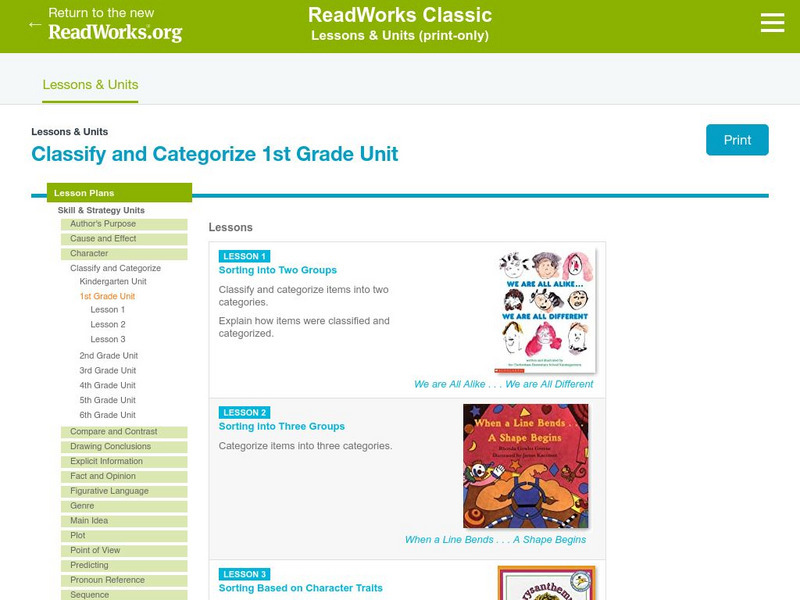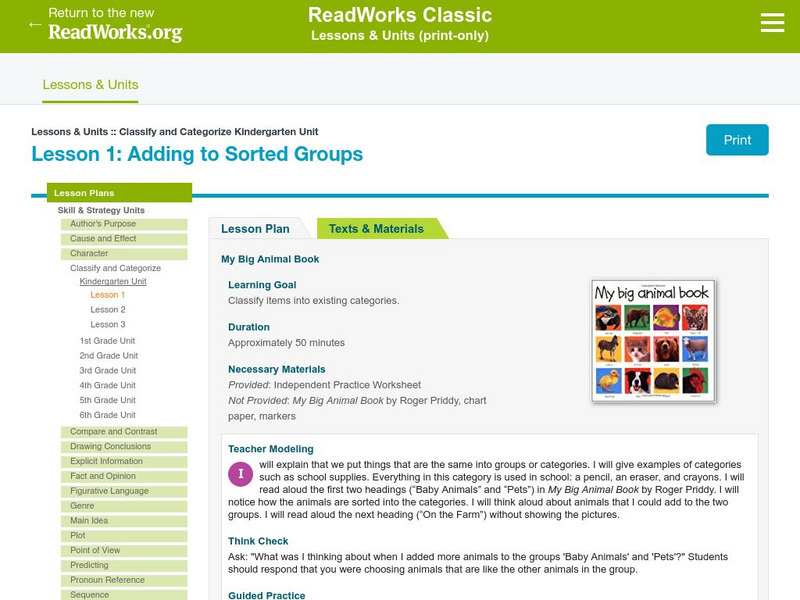Hi, what do you want to do?
Curated OER
Household Hazardous Waste Identification
Fourth graders learn about reduce, reuse, and recycle and identify household hazardous products. Students learn about less hazardous alternatives and complete an inventory of hazardous materials in a typical household.
Curated OER
Let's Clean the Beach!
Learners volunteer their time to clean a local park. They estimate the amount of debris they collect and make observations. They write a poem and draw an illustration about their experience.
Curated OER
Household Hazardous Waste Identification
Fourth graders discuss the concept of reduce, reuse and recycle. They identify products in their homes that are hazardous and discover alternatives to them. They examine the inventory of other classmates hazardous materials.
Curated OER
Discovering the Deep
Students explore the world's oceans. They research questions about the oceans and write a research report about an ocean animal. Students identify at least four different writing genres they experienced while reading about the ocean.
Curated OER
What's Hatching in Kindergarten?
Students identify oviparous animals. They brainstorm a list of animals that lay eggs, read "Chickens Aren't The Only Ones" by Ruth Heller and then add to the list. Students complete a booklet that shows an egg and an oviparous animal.
Curated OER
Adaptations To the Environment
Learners design and construct an imaginary animal that is perfectly adapted to a particular type of biome. They give the animal a scientific name, place it in a phylum and write descriptions about its behavior, reproduction, foraging,...
Curated OER
Compound Word Match-Up
Second graders demonstrate an understanding of compound words. They create a compound word with a partner. In addition, 2nd graders correctly use their compound word in a written sentence.
Curated OER
Kitchen Calculations
Students compare eggs to other foods as a cost-effective protein source. They use formulas to determine prices in a worksheet and in local newspaper ads.
Curated OER
Can You See It, Touch It, Hear It?
Students develop and practice observational skills through lab activity.
Curated OER
The Cost of Life
Learners research the salary for a career of interest. They consider what kind of lifestyle that career would provide and graph their information for comparison.
Curated OER
Seeking Super Cities
Students view a Powerpoint presentation on various cities in the U.S. They conduct research on two cities, complete a data chart on the two cities, and decide which one they would prefer to live.
Curated OER
Learning to Live Responsibly Within One's Personal Resources
Students explore survival techniques in the light of their own values and personal situations. The differences between needs and wants and how consumerism effects the environment forms the main focus of this three lessons unit.
Curated OER
Design your own Water Temperature Experiment
Learners use Robolab sensors and software to design an experiment that incorporates the use of temperature probes. They conduct the experiment, complete a lab sheet, evaluate the results and then consider if their hypothesis requires...
Curated OER
Sort It Out and Match It Up
Students identify objects that are the same shape and size. They compare and contrast attributes of two-and three-dimensional objects using appropriate vocabulary. Pupils justify an extension of a geometric pattern to explain what was...
Curated OER
Understanding the Purpose of Provincial Government
Students examine a mixed bag of objects and discuss their relevance to "government." They discuss the three branches of Provincial Government and the purpose of each.
Curated OER
Activity # 13 Float or Sink?
Students have seen that solids, which are more dense than a liquid, that sinks in that liquid and solids, which are less dense than a liquid, that floats on that liquid. They use a metal boat to float in water. Pupils comprehend that...
Curated OER
Acids and Alkalis
Young scholars determine and explain the characteristics of alkalis and acids. With their list of characteristics student groups conduct an investigation into whether various household substances are alkali or acid. Their lab findings...
Curated OER
Famous Virginian Biography Project
Fourth graders research, analyze and complete a writing project on the history of Virginia. They are assigned a famous Virginian to research utilizing a variety of resources and then prepare a written report and an oral presentation to...
Curated OER
Shape Walk
Students take a field trip to a local park or beach to collect objects. They practice counting the objects and put them into categories according to type of shape like a cone, cylinder, etc... As an extension to the lesson students could...
Curated OER
Seeing and Hearing Game
Students study the animal senses. In this animal senses lesson, students act out animal movements and make animal sounds. They use "see and hear" cards to play a game in which they find another child with a either "make a sound or...
Curated OER
Going Buggy!
Students study bugs over a four week period. In this insect collection of activities, students observe insects covering basic science concepts and skills, such as classification, observation, and responses to habitat....
Curated OER
Amphibian Features - Frog Dissection
Seventh graders examine the physical features of an amphibian. In this investigative lesson students compare and contrast the anatomy of a frog to a human.
Read Works
Read Works: Classify and Categorize 1st Grade Unit
[Free Registration/Login Required] A three-lesson plan unit on classifying and categorizing through which young scholars learn how to sort items into two and three categories and explain how each group is classified. Finally, students...
Read Works
Read Works: Classify and Categorize Kindergarten Unit: Adding to Sorted Groups
[Free Registration/Login Required] A lesson using the book My Big Animal Book by Roger Priddy in which students learn to sort items into predetermined categories. Ideas for teaching, guided practice, and independent practice are...




























